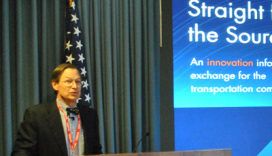Harvard Professor Offers Insights on Urbanization and Congestion
Professor Jose Gomez-Ibanez collects cities, "and I'll keep collecting until a find a solution to congestion," he said. The Harvard professor of urban planning and public policy recently spoke at Volpe's speaker series, where he revealed his insights on urbanization, modal shift, and congestion. Drawing particularly from his research in cities such as Jakarta, Ho Chi Minh City, and Mumbai, Gomez-Ibanez pointed to the inherent conflict between increasing urbanization and smart transportation planning.
"Urbanization is really one of the defining trends of our time. This rapid urbanization that we're experiencing is largely because cities are the engines of economic growth in a lot of these developing countries...but if there are benefits, there are also costs in terms of congestion, pollution, and other externalities that are associated with growth," said Gomez-Ibanez.
Suggesting transportation and land use policies as a way to mediate the negative effects of urbanization and enhance the positive ones, Gomez-Ibanez pointed out that unfortunately most cities have been unable or reluctant to implement major policies to decrease congestion, in fear that it would affect economic productivity. "Short of the permit controls of China, there is very little you can do, incentive-wise, to combat congestion because these cities are so necessary for income growth and economic activity."
As an alternate response to the usual public transportation versus cars debate, Gomez-Ibanez champions the motorcycle as a dark horse of the modes, citing its rise in popularity in Southeast Asia for its ability to provide the benefits of private transportation while at the same time being more economical and less polluting than a car.
For a video excerpt of Professor Gomez-Ibanez's talk, click here.

